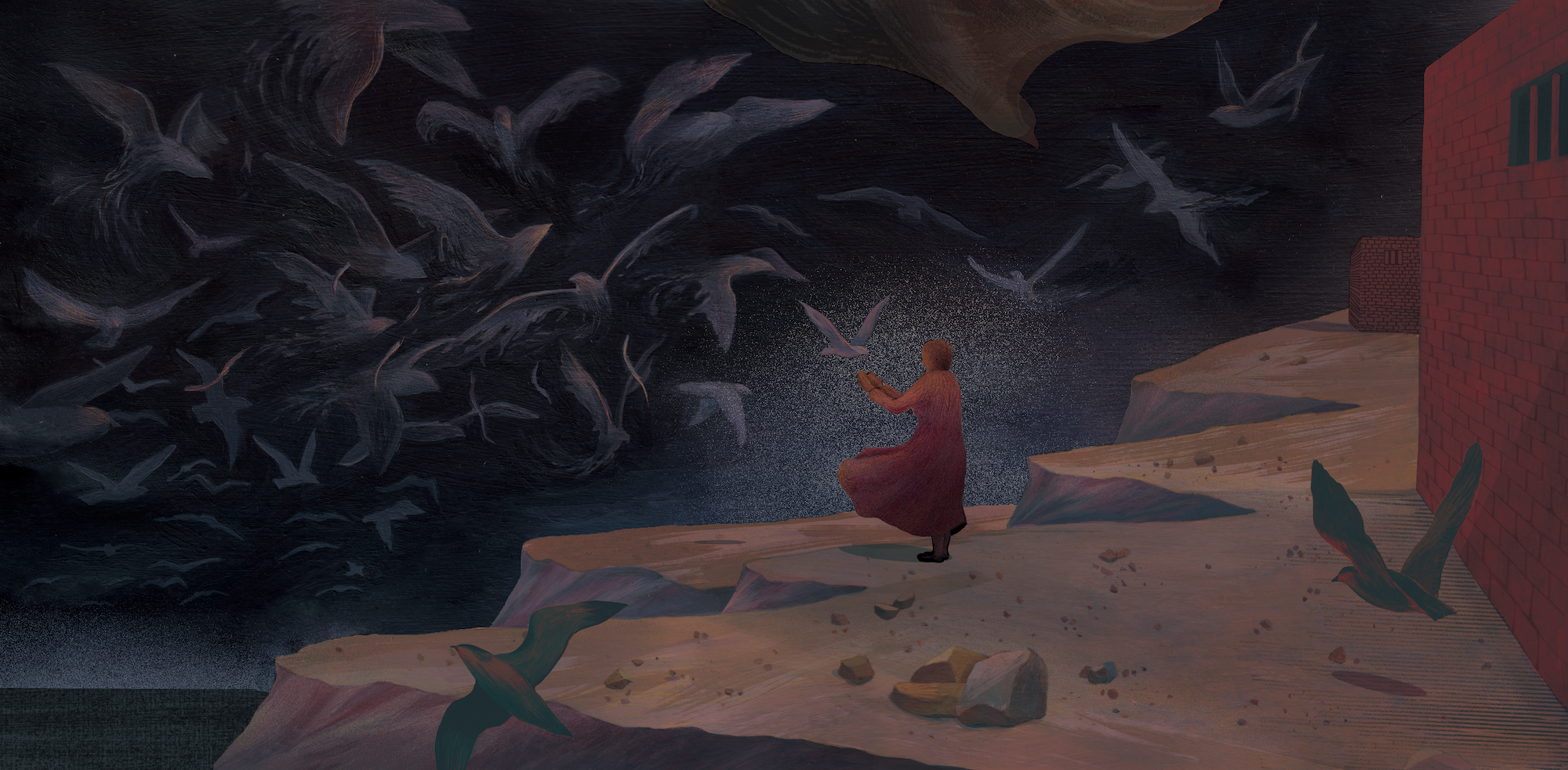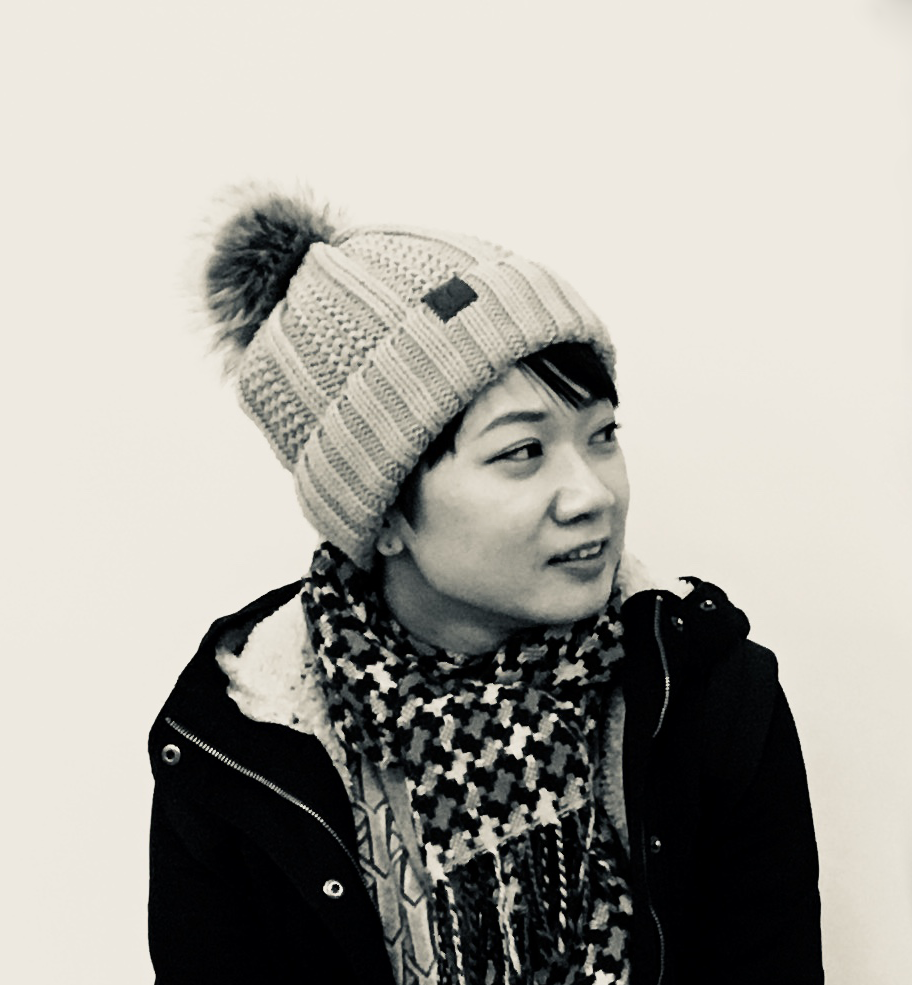An Incomplete Account of the Case of the Bird-Talker of Yaros
by Eleanna Castroianni
Illustrated by Pao-ju Lin | Edited by Kate Dollarhyde
Copyedited by Chelle Parker
August 2020
2396 words — Reading time: around 11 minutes
PANAYOTIS M., interviewed by Eleni Haji, November 1975
When I first saw her, she was covered in wings. Sea birds flocked to her as if she was honey and they were the bees. Watching from the men’s prison, we could always tell which was her cell window by the cluster of flapping, squawking gulls.
The guards were furious. They would thrash around to drive the birds away or even keep her locked in isolation in windowless rooms. But I know she still spoke to them, all of them. A chirrup here, a cry there. You can’t stop them. Birds carry words, my father used to say. Their wings are speech.
“Packages and other mail from relatives are not accepted, given that the inmates are not in need of additional food items or other material.” — Pavlos Totomis, Minister of Public Order, May 9th, 1967
CHRYSSOULA K., diary excerpt
April 21st, 1972
Three months in prison; five years of the Colonels’ regime. April 21st is my birthday, you know. Five years ago, on my birthday, we became this unfree country.
My father disappeared immediately. Mother was smarter. She knew our family was too political, too vocal, and that she had to look after us. They came one day at the school where she worked and took her. She was tortured for a week in Perissos, yet never revealed our whereabouts.
I wasn’t smart like her or like my siblings. I itched to join the anti-Junta action. I was caught along with other students after a failed bombing attempt. We had targeted the foreign cars, the French Embassy. To make them do something. To force them to act and stop looking the other way like nothing’s happening to us. And here I am: earned myself three months and counting in Yaros, the Death Island, on a steady diet of humiliation and deprivation. The food, I can handle. The beatings too.
But not the letters. They’re taking our letters. No prison ever was so cruel.
“Greece and France have different approaches to Democracy. This, however, is completely irrelevant, because every state is free to govern in different ways. The French government has adopted the principle of not interfering with other countries’ internal affairs.” – French State Secretary of Foreign Affairs, during a visit to Greece, January 27th, 1972
PANAYOTIS M., interviewed by Sotirios Iakovidis, 1986
The island was a place forgotten by the gods: time had stopped, life had stopped. A place where everything was grey and dry. The little we saw of it, you could say it was like every other island, really — rocky, low vegetation, blazing sun. And a smell of death everywhere. It was small — just big enough for a red-bricked prison and little else. Can you imagine a tiny island that has a giant prison on it and nothing else but rocks? It’s like a prison within a prison.
The Junta never wanted the outside world to know what they were doing. Many knew, of course. All the world’s elite, the governments, the oligarchs. All these had excellent relations with the Junta — business deals and so forth. But they all had to maintain appearances, you see. So they hid everything out of sight, sent people to islands like Yaros and Makronisos. Foreign reporters begged to be allowed there, and never once were they, not in all the Seven Years. Many foreign governments pretended on the surface to disapprove of the human rights abuses, while in the meantime did business under the table.
They were crafty with the image they showed in public. The Regime fed people cheap entertainment, pretty movie stars, that sort of thing. The same people numbed and put to sleep by those cheap tricks will tell you that the seven-year regime was not so bad. That it was okay, that we didn’t go hungry like we did in the Civil War. But for us who dared speak up against it? Torture, exile.
I spent six months in Yaros — my father fought with the communists in the war with the Germans and in the Civil War, so I was on the list, of course. Everyone with a family history like mine would be. They came to me quietly in the kafeneio where I used to go and seek work, because my cousin and I painted walls those years. They took me to Perissos. They insulted me, stripped me naked, blindfolded me so I couldn’t see what they were doing. They aimed for the most vulnerable parts, those that hurt most: your armpits, your genitals. I stayed there for maybe a few weeks? Then it was Yaros for me. Yaros was the Death Island. And Kera-Thalassini was what kept our minds together.
“Your wife gave birth to a baby girl. Kera-Thalassini said so.” That’s what someone whispered to me one morning. By word of mouth, the news had reached me. Whispers. Bird whispers! I will never forget those words, the tears they brought to my eyes. You know, they took me when she was four months pregnant. And now I was a father. A girl. I kept crying, the salt of my tears stinging my eyes. A girl. Did she have my wife’s eyes, her dark hair? Would I be there to see her make her first steps, to hold her in my hands? Would she grow up in a better world than the one she was born into? Every morning I asked myself these questions. Every morning I watched the red bricks of Kera-Thalassini’s cell, with the gulls always loitering around the window, and thanked her. I never had a chance to talk to her but, even to this day, I thank her.
“The communist inmates, always working against Greece, want you to visit the prison with the purpose of using us to internationally defame their own country. We will allow journalists to talk to them only when they stop waiting for help from foreigners and only when they learn to believe in Greece and to think as Greeks.” — Brigadier General Stylianos Pattakos, Minister of Interior, June 6th, 1967
CHRYSSOULA K., diary excerpt
August 29th, 1972
It’s true what they say of the old lady that talks to birds. She arrived a little over two months ago. Some say a sparrow lives inside her clothes, whispering witchcraft to her, but I haven’t seen it. Although I heard what she told Irini the other day: “Your brother was found. He’s safe back home.” When Irini asked her how she knew, she only said, “Your letters. They’re tossing them in the sea. My birds pick them up.”
I didn’t want to believe in her witchcraft, but I did. It’s the only thing left to believe here, at the end of the world. I begged her. Any word of mother? Of my sisters?
Yesterday, she finally told me. “Antigoni got married.” She smiled a bird-smile, showing me yellowed teeth. Three words, three small words that brought my sister’s face in my mind — her sweet smile and dimples.
My dear people. Wait for me. I’m coming home.
“FRIDAY: Lentil soup 140 gr., olives 50 gr., boiled potatoes 400 gr., one lemon.”
THALASSINI V., transcription of her story as recorded by an anonymous inmate, April 1973
First it was the blackbirds. They came to me, asked for food and so on. Then the magpies followed me around demanding trinkets! [laughs] I gave them colorful beads or pieces of shiny foil. Little Bird Girl they called me. Village folk had no problem with me. They liked it. Thought I was gifted by God. I gathered the birds around me and away from their crops. I brought them good luck.
When I went to the city, I was eighteen. 1920, September. Ah, I [inaudible] hidden. Pigeons, those little rats with wings, they were everywhere. They rule in the cities. They just flocked to me and told me everything. Everything! So, one day, in 1969, they told me of the soldiers near my house. Told me where these people took my daughter. I went after her. And still, I haven’t found her. The birds couldn’t tell me. And the police wouldn’t. Ended up here, on the Death Island, because my late husband and now my daughter were both on the lists of communists. I wasn’t tortured; they just shipped me quietly here, where I couldn’t keep searching. Maybe they thought I was becoming a problem to them. But I was happy when they sent me here. I thought, this is my chance, maybe my girl is here.
But she’s not. I’m still asking the birds where she is. But they just flick their beaks and say nothing. None of them knows anymore.
“I will make an effort, even if they don’t change their minds, to improve their living conditions as much as possible — for example, to allow them to stay in smaller, less crowded cells. They are getting fed well, of course. They have a doctor and everything they need. I will try to make their stay as comfortable as possible, because I am human too. But I will not allow them to become beasts under communist orders, because if they turn into beasts and leave the cage, I will be obliged to shoot them, as the police shoots the lion that leaves the zoo’s cage and threatens the lives of citizens.” — Colonel Georgios Papadopoulos, Prime Minister, March 1st, 1968
CHRYSSOULA K., diary excerpts
May 24th, 1973
Kera-Thalassini has died. We’re crushed.
They took her three days ago. They strappadoed her for hours, those bastards. An old woman. For hours. I can barely believe it. They did it to me for maybe twenty minutes in Perissos and I know that my shoulders will never recover. And you can’t keep someone hanging from their wrists for more than an hour. They will die. They will fucking die. Did she bother them so much? ‘Cause they don’t torture in Yaros. They just let the isolation kill you. Did she bother them so much, then? Did her birds remind them how, no matter how they lock us in, we’re free, we’re always flying free?
There’s no one to claim her body, no relatives. We asked to bury her on the beach. I hope the bastards will grant us this at least.
May 25th, 1973
We said goodbye to Kera-Thalassini. I will never forget this day. Dozens, perhaps hundreds of birds came to claim her body. “Birds have no soul,” someone said, “but they came to take hers.” These words stayed with me. The birds probably love her as much as we do.
I’m sorry you died in prison. You are forever flying free.
“The living conditions of the inmates of Yaros are good and constantly improving.” — Brigadier General Stylianos Pattakos, Minister of Interior, 1967
PANAYOTIS M., interviewed by Eleni Haji, November 1975
None of us quite believed what we saw. All the birds came down on top of her, started eating her flesh. No one reacted, not even the guards at that point. We all knew she belonged to them.
Those of us who were lucky, we watched from our prison cells — only a company of two was allowed to go to the beach. They said it was horrifying and majestic. From my tiny prison cell, it certainly was.
Then the song started. A song to pierce your ears. Everyone could hear it, no matter how far their cell was. The guards tried to drive the birds away but soon they were running away from the terrible noise. A huge bird I’ve never seen before, white and long-necked like a swan, with the wingspan of an albatross, flew down and didn’t stop singing until the birds had left nothing of her. Then, when all the other birds had flown away, the large swan-like bird dropped dead on the sand and its carcass was left there for the sun to bleach. I saw it, with my own two eyes. But several others said they saw the swan flying that very evening, and the day after. I can’t tell. I never saw this bird again.
I don’t think they just ate her. I think she’s with them now.
“Arriving from Yaros, I would like to express my warm thanks for the exceptional treatment and the excellent living conditions. Any claims to the contrary are all slander by the enemies of our Country. I assure you that I will work tirelessly to support the work of our National Government.” — Purported statement of a former Yaros inmate, September 6th, 1967
THALASSINI V., transcription of her story as recorded by an anonymous inmate, April 1973
Ah, I don’t think I’m as good as I used to be. You see, whenever I ask of my daughter, they never answer to me in human words. I can only hear the bird noises everyone else hears. I insist and then they stop talking. [pause]
This isn’t new. Has been happening for a while now. But lately it’s hard to listen to other talk, too. Maybe I’m too old. “Did you pick up any words on the waves?” I ask and they say nothing. Just broken pieces, syllables. I’m too old. [long pause]
I might die soon. And still no word of my child. I don’t know. The birds don’t know. There’s nothing that the birds don’t know. Birds can even travel to the underworld, you see. They can even speak of the dead. But never of my daughter. Is she alive? Is she dead? Maybe she is somewhere else entirely, a place where no soul ever treads. Maybe that was the only place she could be safe. [manuscript ends]
“Here, the rats will gnaw even at the ferrous earth.” — Aristotle on Yaros, quoted by Claudius Aelianus
CHRYSSOULA K., diary excerpt
June 6th, 1973
Today is my last entry. Today, I am released.
I saw a swan flying over our heads this morning. If it’s you, Kera-Thalassini, I thank you.
“Rome, Yaros, Athens, prison: one and the same.” — Epictetus
SAVVINA M., poem, 1981
(found in a diary of a girl from Kea island, in which she supposedly collects messages she receives from birds)
This is what the swans sing:
Mother
I became a bird
So I could find you
But birds never speak
Of other birds
But I was too late
Too late.


